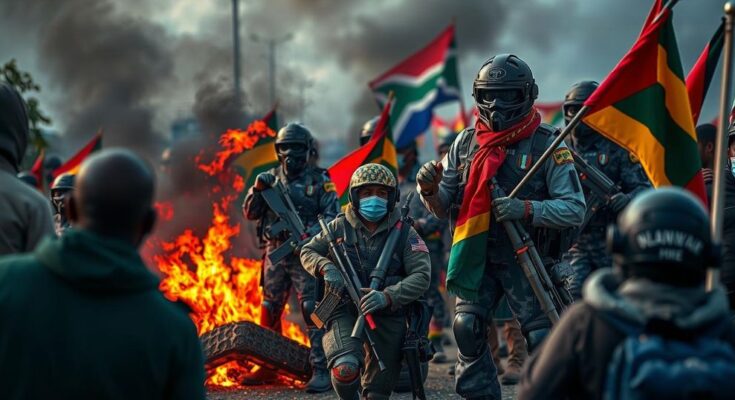Mozambique is experiencing fresh protests against disputed election results, leading to police violence and the death of two individuals. The main border with South Africa has been closed due to demonstrators blocking traffic. Opposition leader Venancio Mondlane has called for further protests, claiming the elections were fraudulent amidst reports of human rights violations and irregularities. The Southern African Development Community is set to hold a summit to discuss the escalating situation.
Fresh protests erupted in Mozambique on Wednesday, resulting in clashes with police, which reportedly left two individuals dead. This unrest is a continuation of public dissent against the recent election results, which declared the ruling Frelimo party, in power since 1975, the victor of the October 9 elections. Opposition leader Venancio Mondlane has called for a renewed wave of demonstrations, asserting that the elections were tainted by fraud, a claim supported by observations from Human Rights Watch documenting over 30 fatalities due to police responses to earlier protests. The violence escalated in the northern city of Nampula, where law enforcement used live ammunition against demonstrators, according to local reports. “At around 8:00 am, young people gathered in the Namicopo neighbourhood to march towards Nampula city centre,” stated civil society activist Ivaldo Nazare. Local sources confirmed that police had surrounded protest areas and fired upon the crowd. Meanwhile, in the south, Mondlane’s supporters barricaded the Ressano Garcia border with South Africa, stranding numerous trucks and prompting South Africa’s Border Management Authority to close the Lebombo post to mitigate disruptions from ongoing protests. Protesters expressed their frustration over the electoral process, with one stating, “We want the results to be clear, because the people are tired. We want the truth.” As regional tensions grow, the Southern African Development Community (SADC) has announced an extraordinary summit this weekend to address the situation. Adding to the complexity, election observers have cited irregularities during the vote, while Mozambique’s Constitutional Council is tasked with confirming election results ahead of the imminent transition of power.
The political climate in Mozambique has been tense, particularly following the recent elections, which have been marred by allegations of fraud and irregularities. The Frelimo party, which has held power since Mozambique’s independence in 1975, faced significant opposition, culminating in a series of protests led by opposition figures such as Venancio Mondlane. Human Rights Watch has highlighted the lethal consequences of the government’s response to dissent, reflecting broader concerns regarding governance and electoral integrity in the country. As Mozambique approaches a leadership transition, with President Filipe Nyusi due to step down after two terms, the continuation of such protests raises questions about much-needed political reform and transparency in future elections.
The situation in Mozambique is marked by heightened tension following the disputed election results that led to violent protests and police repression. The fatalities reported in recent demonstrations underscore the urgency for dialogue and resolution. As the Constitutional Council prepares to verify election results, the need for transparency is critical. The international community and regional bodies like SADC are poised to play vital roles in addressing the unrest and facilitating a peaceful transition of power.
Original Source: www.barrons.com




